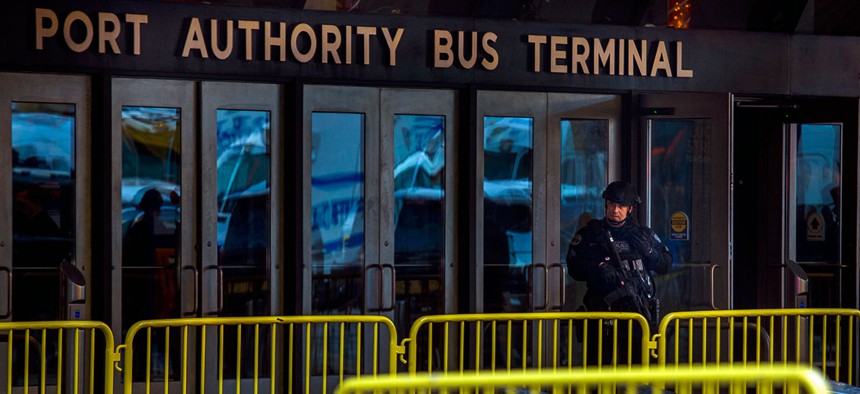Trump’s Budget Cuts Could Make New York City Commuters Even More Vulnerable To Attacks
The administration wants to slash funds from urban anti-terrorism programs to fund a wall with Mexico.
New York is more reliant on public transportation than other US cities and the attempted attack in the Port Authority this morning highlights the city’s vulnerability, security experts say. The Trump administration’s priorities, and the president’s on-going battle with America’s big cities over immigration, could make things more dangerous.
About 7.5 million Americans, just 5.1% of the country’s total, commute by public transportation every day (the vast majority of Americans drive to work instead). The New York City region is by far the most dependent on public transportation in the nation, with almost six times as many passengers than the next-closest region, Los Angeles.
Public transportation is controlled and policed by a patchwork of local and state governments, and sometimes even private owners. Many of these operators have been constrained by recent budget cuts, and face even more belt-tightening under the Trump-backed tax reform bill, which could trim state and local tax revenue. Much of the transportation was built long before terrorism was a serious concern, and modifying these networks would be costly, or nearly impossible.
The Metro-North railway system, for example, which carries about 300,000 people every weekday, stops outside of Manhattan at a series of open-air train platforms with no security whatsoever. There are no metal detectors or screening systems on any US subways, or at the entrances to most bus terminals.
Passengers take nearly 5.7 million rides a day on the New York City subway system, the most in the US, but far fewer than in Asian capitals including Tokyo and Seoul.
Extra security is built into new transportation networks: in New Delhi, India, for example, everyone who gets onto a city subway goes through a metal detector and their bags are x-rayed. Security on China’s trains includes luggage screening and limits on matches and lighters. Parts of New York’s subways, however, are over a century old.
On Monday morning, tuspect Akayed Ullah allegedly detonated a homemade pipe bomb in the subway tunnel between Times Square and the Port Authority bus terminal, injuring three. Police officers prevented a much more serious incident, however, because they stopped Ullah from detonating another bomb, the New York Daily News reported.
The time and place were carefully chosen, security experts say.
“It’s Monday morning at 7:30am. That’s not an accident,” said James Norton, a former Department of Homeland Security official who worked in the George W. Bush administration, and now heads Play-Action Strategies, a DC consulting firm.
Security costs money and slows commutes, and decisions about how much screening to put up on public transportation are made using a “risk formula,” Norton said. US public transportation owners have calculated that the most effective use of money was screening in aviation, and relying on backup like roaming federal security teams on trains and buses.
“We may have been lucky for the last 15 years, and its seems like the luck is running out,” Norton said, citing the two terrorism-related incidents in New York City in less than two months.
But the Trump administration has proposed a budget that slashes fundsfrom some DHS anti-terrorism programs in order to fund a wall with Mexico, he pointed out. Incidents like Monday’s mean we “have to ask if that’s the best place to put the money,” Norton said.
Under Trump, the Department of Justice is also trying to cut security funding from so-called sanctuary cities, including New York, which refuse to enforce the administration’s policies on undocumented immigrants. After the Oct. 31 terrorism attack in New York that killed eight, New York senator Charles Schumer called on Trump to rescind terrorism-related budget cuts.
NEXT STORY: The Annual Pay Ritual Has Lost Relevance



